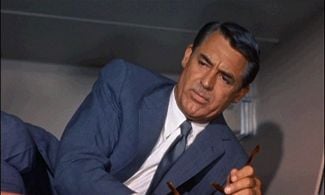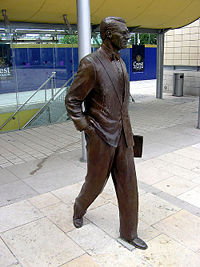Cary Grant
| Cary Grant | |
 Cary Grant as seen in North By Northwest. | |
| Birth name: | Archibald Alexander Leach |
|---|---|
| Date of birth: | January 18 1904 |
| Birth location: | Bristol, England, UK |
| Date of death: | November 29 1986, age 82 |
| Death location: | Davenport, Iowa, USA |
| Academy Awards: | 1970 Lifetime Achievement Award |
Archibald Alexander Leach (January 18 1904 – November 29 1986), better known by his screen name, Cary Grant, was an English film actor. With his distinctive Mid-Atlantic accent, he was noted as perhaps the foremost exemplar of the debonair leading man, not only handsome, but also witty and charming. He was named the second Greatest Male Star of All Time of American cinema by the American Film Institute.
Biography
Early life and career
Archibald Leach was born in Horfield, Bristol, England. An only child (before he was born his parents had had another son who died in infancy), Leach had a confused and unhappy childhood. His mother, Elsie, was placed in a mental institution when he was nine. His father told him that she was dead, and he only learned in 1935 that she was still alive, in an institution.
This left Leach with an insecurity in his relations with women and a secretiveness about his inner life. These insecurities, by his own admission, led him to crave applause and attention and to create a new persona that would attract it. After being expelled from Fairfield Grammar School in Bristol in 1918, he joined the Bob Pender stage troupe.
He traveled with the troupe to the United States in 1920 for a two-year tour. When the troupe returned to England, Leach decided to stay in the United States and continue his stage career. Still as Archie Leach, he performed on the stage at The Muny in St. Louis, Missouri, in such shows as Irene (1931); Music in May (1931); Nina Rosa (1931); Rio Rita (1931); Street Singer (1931); The Three Musketeers (1931); and Wonderful Night (1931).
Hollywood stardom
After some success in light Broadway comedies, he came to Hollywood in 1931, where he acquired the name Cary Grant.
Grant starred in some of the classic screwball comedies, including The Awful Truth with Irene Dunne, Bringing Up Baby with Katharine Hepburn, His Girl Friday with Rosalind Russell and Arsenic and Old Lace with Priscilla Lane. These performances solidified his appeal, and The Philadelphia Story, with Hepburn and James Stewart, presented his best-known screen role: the charming if sometimes unreliable man, formerly married to an intelligent and strong-willed woman who first divorced him, then realized that he was — with all his faults — irresistible.
Grant was one of Hollywood's top box-office attractions for several decades. He was a versatile actor, who did demanding physical comedy in movies like Gunga Din with the skills he had learned on the stage. Howard Hawks said that Grant was "so far the best that there isn't anybody to be compared to him". Grant was a favorite actor of Alfred Hitchcock, notorious for disliking actors, who said that Grant was "the only actor I ever loved in my whole life". Grant appeared in such Hitchcock classics as Suspicion, Notorious, To Catch a Thief and North by Northwest.
Personal life in Hollywood
Grant's first wife was actress Virginia Cherrill. They married on February 10, 1934, and divorced just over a year later on March 26, 1935.
After becoming a naturalized U.S. citizen in 1942, he married ultra-wealthy socialite Barbara Hutton, becoming a surrogate father and lifelong influence on her son, Lance Reventlow. The couple was derisively nicknamed "Cash and Cary", though an extensive prenuptial agreement was signed before the marriage. However, when he and Hutton divorced in 1945, Grant refused to accept a money settlement from her and they remained friends.
Grant's third wife was actress and writer Betsy Drake. This was his longest marriage (December 25, 1949 - August 14, 1962). In the early '60s Grant related how treatment with LSD at a prestigious California clinic — legal at the time — had finally brought him inner peace after yoga, hypnotism, and mysticism had proved ineffective. In a 2004 interview for the Turner Classic Movies production, Cary Grant: A Class Apart, Drake mocked rumors of Grant's homosexuality. "I didn't have time to think about his homosexuality," she says, "we were too busy fucking."
His fourth marriage, to actress Dyan Cannon, on July 22, 1965, in Las Vegas, resulted in the birth of his only child, Jennifer, when he was 62. The marriage was troubled from the beginning (Grant was 61 and Cannon was 28), and they separated within 18 months, with Cannon claiming that Grant spanked her for disobeying him. The divorce, finalized on May 28, 1967, was bitter and messy, and the custody disputes over their daughter went on for years.
Grant married British hotel PR agent Barbara Harris (47 years his junior), on April 11, 1981, a marriage which lasted until his death.
Later in Life
In the mid-1950s, Grant formed his own production company, Grantley Productions, and produced a number of movies distributed by Universal, such as Operation Petticoat, Indiscreet, That Touch Of Mink, and Father Goose.
While Grant was nominated for two Academy Awards in the 1940s, he was denied the Oscar throughout his active career as he was considered a maverick by virtue of the fact that he was the first actor to "go independent," effectively bucking the old studio system, which pretty much completely controlled what an actor could or could not do. In this way, Grant was able to control every aspect of his career. The cost was no golden statuette during his active career. Grant finally received a special Academy Award for Lifetime Achievement in 1970. In 1981, he received the Kennedy Center Honors.
In the last few years of his life, Grant undertook tours of the United States with "A Conversation with Cary Grant", in which he would show clips from his films and answer audience questions. It was just before one of these performances, in Davenport, Iowa, on November 29, 1986, that Grant suffered a stroke, and died in the hospital a few hours later.
Legacy
In November 2004 Grant was named "The Greatest Movie Star of All Time" by Premiere Magazine. [1]
Ian Fleming stated that he partially had Cary Grant in mind when he created his suave super-spy, James Bond. Sean Connery was selected for the first James Bond movie because of his likeness to Grant. Likewise, the later Bond, Roger Moore, was also selected for sharing Grant's wry sense of humor.
Trivia
- In the film A Fish Called Wanda, the character played by John Cleese is named Archibald Leach, Cary Grant's real name [2]. Cleese was born in Weston-super-Mare, just a few kilometres from Grant's birthplace, Bristol.
- Although many Cary Grant impressions include the quotation, "Judy, Judy, Judy", Grant never actually said that phrase in any of his movies. In Only Angels Have Wings, his character says "Oh, Judy," and "Come on, Judy," but that's as close as it gets.
- Grant replaced James Stewart as the hapless ad man Roger Thornhill in North by Northwest. Years earlier, Stewart replaced Grant as Rupert Cadell in Rope, in which another character makes reference to Grant's film with Ingrid Bergman, Notorious
- Politically, Grant was a Republican, and he introduced First Lady Betty Ford to the audience at the Republican National Convention in 1976
- Christopher Reeve said he based his portrayal of Clark Kent on Grant's 1938 performance as the awkward bespectacled scientist in Bringing Up Baby. Grant's performance in that film had in turn been inspired by Harold Lloyd.
- Some of his younger fans told him that he looked just like the comic book superhero Captain Marvel. (However, cartoonist C. C. Beck in fact based the superhero's appearance on fellow actor Fred MacMurray.)
- The voice and appearance of Captain Scarlet (the title character of Gerry Anderson's Supermarionation science fiction TV series) is based on Cary Grant's, though he is actually voiced by Francis Matthews.
- Wu Ming's novel 54 features Cary Grant and Archie Leach as two of the main characters. Many aspects of their two-headed persona are explored as the plot unfolds.
- Tony Curtis used Grant's voice style in Some Like it Hot. At one point in the film, Jack Lemmon says that nobody talks like that. The film was set in the 1920s United States, so he was probably right. Reportedly, after seeing the film, Cary Grant said of Curtis's impression, "I don't talk like that."
- In the 2004 film Touch of Pink, Cary Grant (played by Kyle MacLachlan) acts as the "Spirit Guide" and invisible friend of main character Alim.
ReferencesISBN links support NWE through referral fees
- Eliot, Marc. Cary Grant: A Biography Aurum Press, 2005 ISBN 1-84513-073-1
- Higham,Charles and Moseley, Roy. Cary Grant: The Lonely Heart Thompson Learning, 1997, ISBN 0-15-115787-1
- Johansson, Warren & Percy, William A. Outing: Shattering the Conspiracy of Silence. Harrington Park Press, 1994, pp.146-7.
- McCann, Graham. Cary Grant: A Class Apart Fourth Estate, 1997, ISBN 1-85702-574-1
- Morcambe, Gary and Sterling, Martin. Cary Grant: In Name Alone Robson Books, 2001, ISBN 1-86105-466-1
- Nelson, Nancy. Evenings With Cary Grant: Recollections in His Own Words and by Those Who Knew Him Best, Citadel Press, 2002.
- Russo, Vito. The Celluloid Closet: Homosexuality in the Movies [revised edition] Harrow & Row, 1987, ISBN 0-06-096132-5
- Wansell, Geoffrey. Cary Grant: Dark Angel Arcade, 1997, ISBN 1-55970-369-5
External links
- Carygrant.net — fan site with filmography etc.
- "The Man From Dream City" by Pauline Kael
- Biography of Cary Grant by cosmopolis.ch
- "Cary Grant: Style as a Martial Art" by Wu Ming
- Crème de la Crème: Cary Grant
Credits
New World Encyclopedia writers and editors rewrote and completed the Wikipedia article in accordance with New World Encyclopedia standards. This article abides by terms of the Creative Commons CC-by-sa 3.0 License (CC-by-sa), which may be used and disseminated with proper attribution. Credit is due under the terms of this license that can reference both the New World Encyclopedia contributors and the selfless volunteer contributors of the Wikimedia Foundation. To cite this article click here for a list of acceptable citing formats.The history of earlier contributions by wikipedians is accessible to researchers here:
The history of this article since it was imported to New World Encyclopedia:
Note: Some restrictions may apply to use of individual images which are separately licensed.
